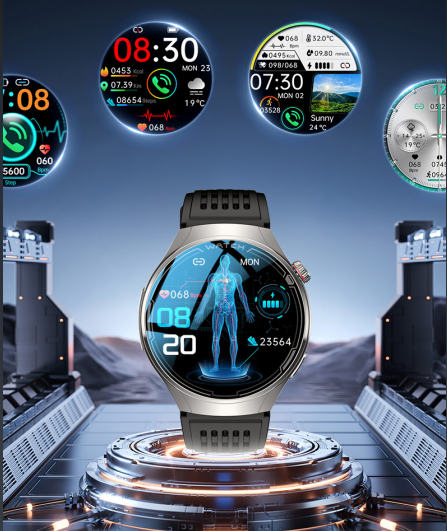4G Smart Watches for B2B Client Safety & Accuracy
Discover how 4G smart watches meet the dual needs of B2B clients for safety and accuracy. Explore the benefits of integrating smart rings and smart rings technology into your business solutions.
10/20/20255 min read


Understanding the B2B Landscape: Safety and Accuracy in Focus
The contemporary B2B landscape is characterized by an increasing emphasis on safety and accuracy, two critical factors that significantly influence purchasing decisions across various industries. As organizations strive to enhance operational efficiencies, the integration of advanced technological solutions has become essential to meeting the dual needs of ensuring safety and delivering precise results.
In sectors such as healthcare, logistics, and manufacturing, the implications of safety and accuracy are profound. For example, in the healthcare industry, the need for accurate patient monitoring and emergency response systems is paramount. A recent study indicated that the implementation of wearable technology, including 4G smart watches, can reduce medical errors by up to 30%, demonstrating the necessity of precise data tracking for patient safety.
Similarly, in logistics, timely and accurate information flow is crucial for maintaining supply chain integrity. Companies investing in 4G smart watches for real-time tracking and communication have reported a 25% decrease in delivery errors, showcasing how technological advancements can directly impact operational performance. The seamless integration of safety mechanisms in these devices complements their accuracy, ensuring that workers are not only informed but also safeguarded in potentially hazardous environments.
Manufacturing sectors are also witnessing a paradigm shift with the adoption of smart technology. The incorporation of 4G smart watches enhances worker safety through immediate alerts in case of emergencies while simultaneously ensuring that production metrics are tracked with high fidelity. The dual focus on safety and accuracy fosters a more reliable working environment, thereby improving overall productivity levels.
Ultimately, organizations must prioritize both safety and accuracy when evaluating technological solutions like 4G smart watches. As businesses evolve, the commitment to safeguarding personnel while ensuring operational precision will undoubtedly shape competitive strategies and influence market dynamics in the B2B realm.
The Role of 4G Smart Watches in Enhancing Safety
In the context of B2B operations, 4G smart watches serve as pivotal tools that enhance safety protocols through various innovative functionalities. One of the primary advantages of these devices is real-time tracking. This feature allows companies to monitor the location of their employees, particularly in industries where workers are dispersed across large areas. For instance, logistics firms can track delivery personnel in real-time, ensuring swift assistance in case of emergencies or hazardous situations.
Furthermore, 4G smart watches are equipped with emergency alert systems that can significantly mitigate risks. Employees can send distress signals with a simple touch of a button, alerting supervisors and emergency services instantly. This capability enhances response times in critical situations, which is crucial for ensuring worker safety. For example, construction companies have reported improved safety outcomes since integrating smart watches into their safety practices, allowing for immediate help when needed.
Health monitoring functionalities also play a vital role in the safety enhancement brought by 4G smart watches. These devices can track vital signs such as heart rate, oxygen levels, and other health metrics that inform employers about the well-being of their workforce. In high-risk environments, such as mining or manufacturing, monitoring these health parameters can preemptively identify any health issues that may arise and allow for timely interventions to prevent accidents or health crises.
Moreover, secure communication channels provided by smart watches ensure that information is conveyed swiftly and securely. This reduces potential communication breakdowns during emergencies, keeping everyone informed and aligned. Companies that have adopted these technologies have experienced a more streamlined communication process, further strengthening their safety frameworks. Therefore, the functionalities of 4G smart watches are indispensable in enhancing safety, providing businesses with tools that not only meet compliance standards but also promote a culture of safety awareness among employees.
Ensuring Accurate Data Collection and Reporting with 4G Smart Watches
In the rapidly evolving landscape of Business-to-Business (B2B) interactions, the integration of technology plays a crucial role in fulfilling dual client needs—safety and accuracy. 4G smart watches have emerged as a reliable solution for ensuring precise data collection and reporting, which are essential for making informed operational decisions. These wearable devices harness advanced technologies such as Global Positioning System (GPS) and various embedded sensors to facilitate real-time data capture and transmission.
The GPS functionality enables 4G smart watches to provide accurate location tracking, which is invaluable for businesses that rely on geographical data for logistics and resource management. This capability supports businesses in achieving operational efficiency, ensuring timely deliveries, and optimizing routes. Additionally, the built-in sensors in these smart watches can monitor various health metrics, such as heart rate and activity levels, which complements data accuracy by providing a holistic view of workforce conditions.
Furthermore, the analytics capabilities embedded within 4G smart watches enhance the interpretation of collected data. Advanced algorithms analyze the data streams, enabling organizations to forecast trends, identify anomalies, and generate actionable insights. This level of data integrity is pivotal in maintaining compliance with industry regulations, as businesses must uphold standards that pertain to operational practices, employee safety, and data handling protocols.
Reliable data collection and reporting empower businesses to make strategic decisions that are backed by comprehensive analytics rather than speculation. As organizations increasingly prioritize safety and accuracy, the role of 4G smart watches becomes ever more significant. By ensuring the integrity of the data collected through these devices, companies can not only improve their operational processes but also reinforce their commitment to clients and stakeholders alike.
Best Practices for Implementing 4G Smart Watches in B2B Environments
Integrating 4G smart watches into B2B operations requires a strategic approach to ensure that both safety and accuracy standards are met. To begin with, it is vital to assess the specific needs of clients. Understanding their unique operational challenges and expectations can guide the selection of appropriate features and functionalities in the smart watches. Conducting surveys or focus groups can provide valuable insights into client preferences and areas where wearable technology can enhance business efficiency.
Once the needs assessment is completed, the next step involves staff training. Employees must be familiar with the device's capabilities to maximize its benefits. Structured training programs should be developed, focusing on both the technical aspects of the smart watches and their practical applications in daily operations. This empowers the workforce to leverage the technology effectively, ultimately boosting productivity and ensuring compliance with safety protocols.
Establishing maintenance protocols is also crucial for the long-term success of integrating smart watches. Regular updates, troubleshooting, and device checks can prevent malfunctions that disrupt workflow. Setting up a dedicated IT support team or collaborating with the watch manufacturer's support service can streamline this aspect of implementation, ensuring that any technical issues are addressed promptly.
Moreover, companies may face challenges such as resistance to change or integration with existing systems. To overcome these hurdles, clear communication regarding the benefits of 4G smart watches and how they complement current processes is essential. Involving employees in the implementation process and seeking their feedback can foster a culture of acceptance and adaptability.
Looking ahead, the landscape of wearable technology is continually evolving. Staying informed about emerging trends, such as advancements in battery life, new health monitoring features, and enhanced connectivity options, can position B2B companies to capitalize on future opportunities and remain competitive in their respective markets.
